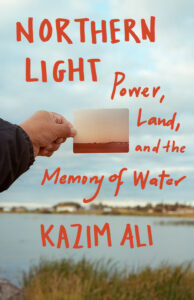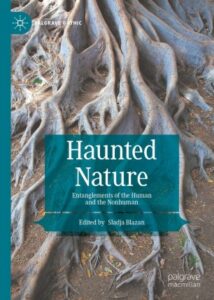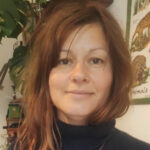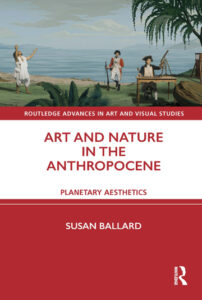This episode was recorded Friday, June 10, 2022
Co-Hosts: Suzanne Roberts and Ryan Hediger
FEATURED GUESTS/WORKS:
 Kazim Ali, Northern Light: Power, Land, and the Memory of Water
Kazim Ali, Northern Light: Power, Land, and the Memory of Water
Kazim Ali’s memoir of growing up on unceded First Nations land in Northern Manitoba reflects on responsibility, memory, immigration, and environmental justice. The child of South Asian migrants, Kazim Ali was born in London, lived as a child in the cities and small towns of Manitoba, and made a life in the United States. As a man passing through disparate homes, he has never felt he belonged to a place. And yet, one day, the celebrated poet and essayist finds himself thinking of the boreal forests and lush waterways of Jenpeg, a community thrown up around the building of a hydroelectric dam on the Nelson River, where he once lived for several years as a child. Does the town still exist, he wonders? Is the dam still operational?
When Ali goes searching, however, he finds not news of Jenpeg, but of the local Pimicikamak community. Facing environmental destruction and broken promises from the Canadian government, they have evicted Manitoba’s electric utility from the dam on Cross Lake. In a place where water is an integral part of social and cultural life, the community demands accountability for the harm that the utility has caused.
Kazim Ali is the author of Northern Light: Power, Land, and the Memory of Water, as well as several volumes of poetry, novels, essay collections, and cross-genre texts. His collections of poetry include Sky Ward, winner of the Ohioana Book Award in Poetry
 Sladja Blazan, Haunted Nature: Entanglements of the Human and the Nonhuman
Sladja Blazan, Haunted Nature: Entanglements of the Human and the Nonhuman
This volume is a study of human entanglements with Nature as seen through the mode of haunting. As an interruption of the present by the past, haunting can express contemporary anxieties concerning our involvement in the transformation of natural environments and their ecosystems, and our complicity in their collapse. It can also express a much-needed sense of continuity and relationality. The complexity of the question—who and what gets to be called human with respect to the nonhuman—is reflected in the  collected chapters, which, in their analysis of cinematic and literary representations of sentient Nature within the traditional gothic trope of haunting, bring together history, race, postcolonialism, and feminism with ecocriticism and media studies.
collected chapters, which, in their analysis of cinematic and literary representations of sentient Nature within the traditional gothic trope of haunting, bring together history, race, postcolonialism, and feminism with ecocriticism and media studies.
Sladja Blazan is a writer and lecturer at Bard College Berlin. Her areas of research include speculative fiction, critical posthumanism, critical refugee studies, and migration.
 Char Miller, West Side Rising: How San Antonio’s 1921 Flood Devastated a City and Sparked a Latino Environmental Justice Movement
Char Miller, West Side Rising: How San Antonio’s 1921 Flood Devastated a City and Sparked a Latino Environmental Justice Movement
West Side Rising is the first book focused squarely on San Antonio’s enduring relationship to floods, which have had severe consequences for its communities of color in particular. Examining environmental, social, and political histories, Char Miller demonstrates that disasters can expose systems of racism, injustice, and erasure and, over time, can impel activists to dismantle these inequities. He draws clear lines between the environmental injustices embedded in San Antonio’s long history and the emergence of grassroots organizations that combated the devastating impact floods could have on the West Side.
Char Miller is the W.M. Keck Professor of Environmental Analysis and History at Pomona College. West Side Rising was awarded two book awards from the Texas State Historical Association. Forthcoming is Natural Consequences: Intimate Essays for a Planet in Peril (Chin Music Press, 2022).
 Susan Ballard, Art and Nature in the Anthropocene: Planetary Aesthetics
Susan Ballard, Art and Nature in the Anthropocene: Planetary Aesthetics
Since the 1960s contemporary artists have engaged with histories of nature, geology, and extinction within the context of the changing planet. Art and Nature in the Anthropocene explores how these artists have challenged fixed categories of animal, mineral, and vegetable—turning to multispecies relations that suggest the emergence of a planetary aesthetics, and presenting a new vision of what it means to live within the Anthropocene.
Susan Ballard is an Associate Professor of Art History at Te Herenga Waka Victoria University of Wellington, Aotearoa New Zealand. She recently curated the exhibition Listening Stones Jumping Rocks at Te Pātaka Toi Adam Art Gallery.
